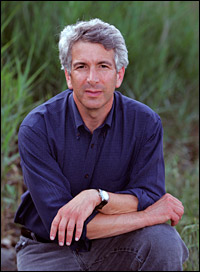
The following is a response to this post.
—–
Ken Ward tracks the evolution of EDF’s position on climate legislation in search of evidence that we’ve relented on tough global warming pollution limits since making climate change a top priority more than ten years ago. He sees our support of the Climate Security Act as a retreat from bold action, as surrender to what’s merely possible in Congress. Far from it.
What shapes our advocacy and our support for that bill is not, as Ken suggests, the limits of politics-as-usual in Washington. It’s shaped by the urgent need to begin reducing global warming pollution — and the fact that as a nation we have failed to take action despite two decades of evidence that we are in deep trouble.
As I told Grist a few months ago, the world and all of its inhabitants face a crisis due to the continuing buildup of greenhouse gases in the atmosphere. We are already seeing the consequences: melting glaciers, rising sea levels, strengthening hurricanes, dying coral reefs, disappearing summer sea ice in the Arctic.
In my view, concentrations of carbon dioxide in the atmosphere are already too high. Our goal must be to reduce those concentrations to today’s levels or below.
And yet our CO2 emissions have continued to grow steadily since 1990 — more than 18 percent, by EPA’s count in 2006. Our failure to act has made returning to 1990 emissions levels something that will take longer to achieve. What was once a bold but achievable first step can no longer be covered in a single stride, and the continued failure of Congress to act makes the task more difficult.
To me, that means we need to take our first bold step as quickly as possible.
I’m optimistic that we can finally get started with a new president — and a political climate that is changing every day thanks to the voices challenging politics-as-usual and pushing for a stabilization target below today’s levels. And we must all do all we can to make sure that our next president sends Congress a proposal built on the foundation of quick action and an aggressive near-term target.
That’s critical to building the broad public momentum and political will we need. One of the most effective things we can do to change politics-as-usual (which in Washington these days often means arguing about costs) is to show that reducing emissions will be good for America because it creates jobs, reduces conventional pollution, lessens our dependence on foreign oil — and at a much lower cost than the defenders of the status quo would have people believe. If we can do that, we can continue to build political will for strengthening the targets, and ultimately reach our goal.
But we can’t do it if we don’t take the first step, and making the ideal step the first might mean we never get the chance to take it. Nor can we do it without a seat at the table — or by denying the business community a seat at the table. Even the broadest alliance of environmental groups will have a tough time breaking the gridlock in Congress and convincing members to deal with the challenges instead of ignoring them.
Passing truly transformational legislation in any Congress requires the support of many sectors and many actors on and off Capitol Hill. Our task is not selling out to them so they will buy into a weak bill. It is, and has to be, crafting a politically durable solution so they can buy into something strong.
Ward thinks our work with the business community has compromised our values and undermined our results. I see them at work in the real world today, from the passage and implementation of AB 32 in California (the first statewide emissions cap in the U.S.), to the dramatic scaling back of TXU’s planned coal build-out in Texas.
And to set the record straight, Ken’s claim that in 2002 EDF called for reducing emissions below 1990 levels sometime before 2040 is simply incorrect. We said that stabilizing atmospheric concentrations of greenhouse gases at 450 parts per million was possible if global emissions peaked early and then declined 1-3 percent each and every year from 2020 to 2040.
Nor has EDF endorsed expanded oil drilling. As I said in this post, it’s just a bad idea and we categorically reject it.


